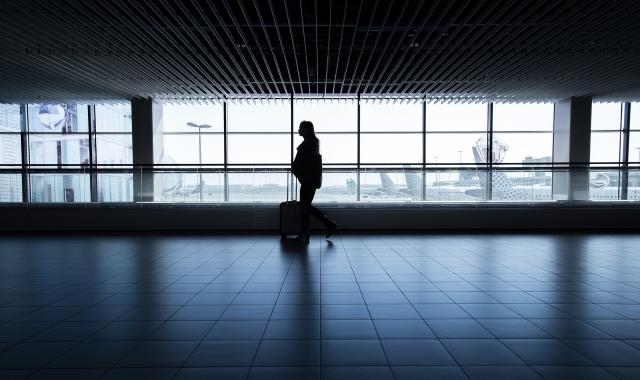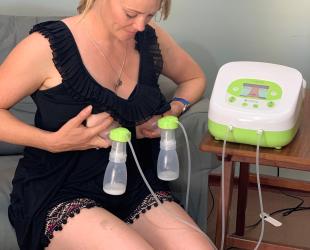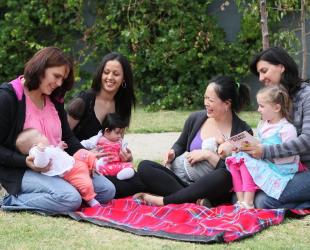Katie's story of breastfeeding and FIFO work
Many mothers successfully combine a return to work or study with continued breastfeeding. Like most things, a little planning goes a long way. In this episode Katie shares with Jessica her story of returning to fly-in, fly-out, work while breastfeeding, including her suggestions for a ‘FIFO kit’ of how she set herself up to succeed.

Podcast episode
Podcast information
Katie's story of breastfeeding and FIFO work
Many mothers successfully combine a return to work or study with continued breastfeeding. Like most things, a little planning goes a long way. In this episode Katie shares with Jessica her story of returning to fly-in, fly-out, work while breastfeeding, including her suggestions for a ‘FIFO kit’ of how she set herself up to succeed.
Links to resources and information discussed in this episode:
- Going back to work resource toolkit, covering information on:
- Your breastfeeding options
- Making a breastfeeding and work plan
- Pumping at work - what do I need?
- Why keep breastfeeding?
- How your workplace and child care centre can support you
- Do I need to pump a milk stash?
- Helping your baby to take expressed breastmilk
- Coping with the emotional challenges
- Breastfeeding: women and work booklet, available for purchase as an instant download or order in print format
- Choosing a breast pump information
- Using a breast pump information, including information on how to clean your pump parts and expressing containers
- Storing expressed breastmilk information
- Breastfeeding: expressing and storing breastmilk booklet, available for purchase as an instant download or order in print format
- Information on expressed breastmilk and air travel
- A caregiver's guide to the breastfed baby leaflet
- How breasts make milk information
- Unusual colours (appearance) and smells of breastmilk information
- Oversupply information
- Tongue-tie and breastfeeding information
- Mastitis information
- 12 months and beyond resource toolkit, covering information on breastfeeding and toddlers
Credits: This episode is presented by Jessica Leonard. Featuring Katie. Audio editing by Jessica Leonard. Show notes by Belinda Chambers. Transcription by Elizabeth Beckitt. Produced by Belinda Chambers, Jessica Leonard and Eleanor Kippen.
KATIE: The first time is a lot, like I won't lie to you, but it was a good thing knowing that, even though I was away, I was still doing something that benefited him.
JESSICA: Welcome to Breastfeeding with ABA. A podcast brought to you by volunteers from the Australian Breastfeeding Association. Breastfeeding with ABA is a podcast about breastfeeding - made by parents, for parents. In this episode will be hearing from Katie about her story of returning to fly in, fly out, or FIFO, work while breastfeeding.
This podcast records in different parts of Australia. We acknowledge the Traditional Custodians of the lands we're recording on and the lands you're listening on. We pay our respects to elders past, present and emerging and to any Indigenous people listening. We also acknowledge the long history of oral storytelling on this country and of women supporting each other to learn to feed their babies.
My name is Jessica and I'm a breastfeeding counsellor with the Australian Breastfeeding Association. My pronouns are she/her and I'm speaking to you from the lands of the Wurundjeri people of the Kulin nation.
Our guest today is Katie a mum of one living in Western Australia. Katie, tell us a bit about yourself, your family and where you live.
KATIE: I am on Whadjuk country in the Noongar Nation here in Perth. My pronouns are she/her. And my family; I live with my husband and my little boy, who's just turned 2.
JESSICA: So, can you tell me what was the start of your breastfeeding journey like?
KATIE: It was actually good, sort of. It was the, the only thing in pregnancy and motherhood, that kind of went right for me. Everything was very, very complicated and so I had one thing that went right, and I felt quite passionate and strong about, if this is going right then I have to make it continue to go right. My little boy was born two days before the COVID lockdowns, so it was the one thing that went right so I wanted to keep it going right. I had a huge oversupply though, and my son has a minor tongue tie which complicated things a little bit. But I felt quite passionate about it, so here we are two years later.
JESSICA: So, tell me about your work. What do you do?
KATIE: I'm an archaeologist which sounds really glamorous, but in practicality it means I spend a lot of time away from my family, mainly in the Pilbara, in Western Australia, facilitating mining. So, Aboriginal Indigenous people, quite a lot of their important places and country are also on places that have really important resources for our state. So, my job is to ensure that they’re recorded properly, that they’re looked at, that mining don't just get to have the first and final say because of a resource. It's multiple resources that we need to take care of, and one, just because it has a monetary value doesn't mean it out values everything else.
JESSICA: Tell me a little bit about how you prepared to return to work and to lead up to that and what ended up happening.
KATIE: I can be away for up to two weeks at a time. I went back to work when my baby was ten months old. and I was quite strong that I wanted to continue to breastfeed him. So ahead of going back to work, I was pumping every second feed, so I was actually increasing my supply, which was not the best option in hindsight, and I would do things differently. I would pump at the end of every normal feed just to get little bits rather than, so I increased my supply so that when I went away, I had a full 14 days of four feeds a day frozen in our freezer, 'cause that's where my baby was at, at the time. And then once I was away, I kept up the pumping for the first for three or four months. It was six or seven times a day and then put that milk in 100 mL lots and I put it in the freezer. Luckily, where I stay, generally has freezing options. I have occasionally had to go and ask, you know, kitchen crew can I please use a freezer and to date, everybody, you know is pretty amazing, like I get a few odd looks and then people go, “you're still feeding your baby and you work away. Yeah, of course we’ll help you.” So generally speaking, people are pretty awesome. And they're really, really accommodating.
JESSICA: When you first returned to work, what was it like, sort of that first time that you were away from your baby and expressing breast milk?
KATIE: So, it's challenging. It's challenging, regardless of how you go back to work. You know you've gone from being at home with your baby full time to my situation, I did a couple of days in the office and then I went completely away. It's emotionally challenging and it's physically challenging, and it's mentally challenging for the tiredness, because your, your work. So, in my case I'm working a 10–12-hour day, walking, you know, 13-14km in the Pilbara, looking at Aboriginal sites, surveying the ground, and then I'm coming back every night and I'm still having to wake up three to four times overnight to pump.
JESSICA: I'm just going to explain here because breastfeeding works on supply and demand, meaning that the amount of milk you removed from your breasts puts in the order for the amount you're going to make. If you're separated from your baby, you generally need to express whenever your baby would have fed. So, Katie scheduled for pumping when she went back to work was something like 5:30 AM, 12 PM, 4 PM, 9:00 PM and 1:00 AM. And then she'd try to squeeze in a feed at her morning tea break if she could. For people returning to something like an office job while they're still feeding, the concept works the same way. You want to aim to express at work however many times your bub would have fed if you were with them.
KATIE: And it depends how you're pumping situation is, but for me that's a good half an hour- 45 minutes. And I know for other mums, it's much longer. I would pump until I felt empty rather than for a set time to maintain my supply. And so, when you're pumping to feel empty that can take a long time, there's also the discomfort, I had quite a big supply, so if you're walking around, you're suddenly feeling heavy and sore, and you also have to take your own health into account. I didn't want to get mastitis; I've had it a couple of times at home and knew I was a bit prone to it. And so, you know, I just would have to make the call. I need to go back to the car and pump because I'm going to be sick. And people were pretty good once you explain “actually I could get sick from this,” so yeah, I mean it was, it was a lot. It's not, as he's got older, he obviously feeds less. He mainly just has a feed overnight and a feed in the morning. So, my breasts have adjusted to that when I go away, so now I only pump in the morning and at night. But the first time is a lot, like I won't lie to you, but it was a good thing knowing that, even though I was away, I was still doing something that benefited him in such a way. Which did help the first couple of times with just the being away from your little baby.
JESSICA: And do you feel like it helped you emotionally?
KATIE: Absolutely, it really helped me emotionally because I knew I was away; I knew he was just at home with his dad; and I had all these thoughts and ideas, but because I was pumping out at least I'm doing something and we're continuing what I wanted to do. You know, we weren't sacrificing his health and what I felt was important for him just because I wanted to go back to work.
JESSICA: And what was it like when you got back home at the end of that first trip away?
KATIE: It's actually part of the reason we are continuing to extend breastfeed. I was really, really nervous he was going to have a bottle preference; he wasn't going to be able to feed directly; you know it was a whole heap of things. And don't get me wrong, when he was sort of the 10 to 18 months old, I would get home and his latch would be a bit lazy. Or, you know, I might get a bit uncomfortable, but it's actually the way we connect when I get home. At the moment he's talking and everything and the first thing he says when I get home is boobies and then we spend, yeah, we then spent basically the next two days sitting on the couch feeding, but I think it's in a, it's an emotional come down for me to sort of relax; that I'm home and it's also a way for him to process I've been away for two weeks, “but oh, but she's gonna come home”. My supply does dip a little bit the longer the swing goes. However, I'm quite lucky that direct feeding for a few days when I get home, everything picks back up and it's back to normal. But it's actually really good. Luckily, he doesn't have a bottle preference. When I'm home, he won't have a bar of a bottle. I know that I'm really lucky in that regard.
JESSICA: What's your schedule like when you are working away both in terms of your actual day of work and your expressing schedule?
KATIE: It's generally a 10-hour day. I don't have a roster or anything like that. So sometimes I can be away for 10-14 days, be home for two days and be gone again for 10 or 14. And then you know, over summer I can be home for three months straight. It really depends because of course, I work with a lot of elderly Aboriginal people that can't walk in 45–46-degree heat in December, so it kind of depends. But when I am at work, it's about a 10-hour day. We generally start, if it's hot, we generally start about half past 4, so I have to be up before half past four to have breakfasted and everything else. But then I have to be up even earlier than that because I pump before I leave my room. That's kind of okay though, 'cause I just put my pump on and turn the lights off. And then now that my son is over two, I'm okay to go the whole day and then the first thing I do when I get back in the afternoon is I pump. And then the last thing I do in the evening, before I go to bed is, I pump, and that's enough to see me through at the moment.
But it was quite a different story, I was getting up in the middle of the night, I was pumping at lunch breaks. When I was pumping during lunch breaks, I could only do surveys that had vehicle access, so sometimes we do surveys which are just helicopter access, and we get dropped off on the top of the hill and we walk all day and then they pick us up at the other end. But that's not really conducive for a) carrying your pump around all day and then having somewhere that's cool and quiet to pump. That was one restriction, but apart from that it's been really good. I've got a really, really good Esky, really, really good ice blocks. They're kind of a must have. It was really expensive, but it's been worth it.
And the same thing goes for when I travel home, we generally drive 6 or 7 hours to the closest airport. I take two really good Eskies on the plane as hand luggage packed and packed and packed with as much ice as possible. And to date I've only had to chuck two 100mL satchels when I get home, but they ended up being, I think they were 18-hour days of travel in ice, so, you know, that's pretty good. And then I just put them through the little conveyor belt when I get on the aeroplane. I've been asked once or twice, you know, “why are you carrying two or three litres of 100mL satchels of white liquid?” But now it's pretty normal. I've never been told I can't take it. It’s never been an issue; I just explain what it is and then there's no issue. There's no issue with weight as long as they're in, you know, obviously, sized eskis that can fit in your top luggage. There's no problem if it's overweight or anything like that, because it's milk for my baby.
JESSICA: So, you mentioned when we'd, sort of, emailed a while back that your industry is fairly male dominated. Can you talk a little bit just about your male co-workers and how they've responded to your expressing for your baby?
KATIE: Archaeology, I generally work with a female Arch. However, we are generally the only women on a survey of, you know, 10-15 males and sometimes not even that. My last job I was the only woman for 15 days [laughs]. The people that I work with directly, who I see every week are really, really good. I really recommend just being open and honest and telling people what's happening from the get-go, because initially I was I was quite embarrassed, I was like, oh, you know they're gonna think I'm this hippy mum but actually people have been really, really good, they're just like “oh, wow that's great”. I have unfortunately had the odd comment from idiotic mining men, who have said, you know, they've asked me how old my baby is. And I said, “Oh, he's two.” And then, you know, you get all the comments about why you're feeding a 2-year-old, “that’s too old,” but I don't really care. I'm past the caring point, so yeah, I recommend being open and honest and people are generally good, you know, that's been my experience. I work with a lot, a lot of different people. People are generally good, and they want to help you out so, if you are open and honest, they're pretty good.
Part of my work, I obviously work with elder Aboriginal men, quite senior men, and breastfeeding and that, is kind of women’s business. And I was a bit worried that that would be inappropriate culturally. However, I've had a couple of old guys say to me, you know, when we're with our women, like, it's just totally normal and they tend to breastfeed for a lot longer than Caucasian people. They just, you know- two, three, four. They didn't blink an eyelid, so it's like it's like I found my people when I am- when I'm on survey they're just, like, that's so normal and, because I've returned to work, and I've continued feeding they don't want me to be pumping, you know, eating lunch next to them. That's fine, that makes them uncomfortable. Doesn't really make me uncomfortable, but it makes them uncomfortable, and I'll respect that, hence why I need a separate space like the car to pump in. But they're really supportive and they're really happy to stop and, you know, allow me to pump. They're really happy to make sure that I've got enough ice for the day.
So, all in all, it's been a really positive experience and made me realize people are really good. Yes, you get the occasional idiotic comment but, I get the occasional idiotic comments from my family, and frankly, I get far more idiotic comments from them than I have ever got at work, haha.
JESSICA: Yes, it's always the way isn’t it. [Laughter] Do you have any tips that you wanna share for anyone who might be in a similar situation?
KATIE: Yes, I have a ‘FIFO kit’ I think is what I'm calling it. So, before you go, set yourself up to succeed. When I'm at home, I used to really like pumping into the glass bottles. I like to be a bit more environmentally friendly, however, that's just not realistic, so I take a lot of breast milk storage bags. I do have some reusable ones that can go through the dishwasher, so I recommend those if you're going to do it long term like I am. What I have. So, I take 40 plus bags for every trip. It's more than you're probably going to need, but it's good to have them and it's very stressful thinking “can I use a sandwich bag?” So, take more than you need. And also have a really good stash.
I know, you know, in lots of breastfeeding discussions, stashes are not important really, unless you're doing what I do. Don't go stressing yourself out over a stash that you're never going to use, whereas in my case my stash is really important because I'm physically not here, there's no more milk coming in while I'm away, so have a really good stash and, be confident in your stash and, know your baby’s routine like, we spent 6 to 8 weeks before my first job really figuring out how many feeds he had a day, if they were, you know, good feeds or were there lots of little feeds. Yeah, set yourself up for success and then, have a decent pump with two sets of pump heads. You know, if you're going away for one or two work trips, not necessary, but if you're like me going away all the time- two sets of pump heads- 'cause then if you get back in the afternoon and you've had one that's been out in the heat all day, the last thing you want to do is wash pump heads and then pump. So have two sets. I take eight bottles every trip for the same reason because sometimes you don't want to wash a bottle, or it's got a little bit of milk in it and you want to cool it down so they're from the same date it's just easier to have multiple bottles. Take a plug, not all mining camps, hotels etc, have a plug for the sink, ‘cause you will have to wash your bottles in your bathroom sink. There's not a kitchen sink generally, and so the bathroom sink. I take dishwashing liquid, I take dish sanitizing 'cause I like to sanitize a sink, 'cause I don't know what people have done before me and, I take a bottle scrubbing brush and, a just, a normal scrubber sponge. Clean the sink really well. Take a universal plug, you can get them, you know, the universal plug from hardware stores, that fit anything, and then you’re right to go. I also have a really decent bottle drying rack that goes with me everywhere ‘cause there's nothing worse than having two sets of bottles and then they're not drying in time and then you're wondering about a tea towel, but, you know, you've got from a mining camp. Yeah, no, just don't do it. [laughs] Yeah, I don't, I don't have to sterilize as much 'cause my baby is older so hot water, soap, air dry is fine.
Yeah, so two sets of pump heads, eight bottles, a decent pump that can be battery powered or whatever, so that you're not relying on mains power. And then, if its battery is not rechargeable, extra batteries for it. Dishwashing liquid, a universal plug and a really good bottle drying rack and lots of storage bags and a decent Esky to get it home or to use during the day. Don't freak out when the milk is all different colors when it freezes!
JESSICA: What sort of colours have you found in your milk?
KATIE: It's mostly like quite green, but then I eat a lot of green veggies while I'm away 'cause it's one of the only edible foods on a mining camp. I'll eat a lot of broccoli. And it goes in the freezer looking not that green and it comes out looking green-green. Yeah, don't freak out when it's green or that is really green or it's a bit yellow, it's fine.
JESSICA: Yeah, just be glad that you don't eat a lot of beetroot or licorice because it can come out in all different types of colours.
KATIE: Well, I have had the, the pinky kind of beetroot and thinking “oh my God is that blood?!” But it's not, it's beetroot.
JESSICA: Do you have any final thoughts you'd like to leave us with?
KATIE: I know a couple of mums who have found either returning to work to be a barrier, because they want to breastfeed, or they're going to be away from their baby or whatever. Or have returned to work and just decided that it's not possible. And it is possible, I mean, if it's not for you, it's a lot of work. I, I totally get that. It's not for you, it's not for you. But if it is something you're passionate about and you care about, it is totally possible.
Yeah, and there's you know there's no reason now that I can't have an occasional mums’ night, you know, just separate and I don't have to feel guilt 'cause I know that my baby will be okay, which is really good. It's doable and if you want to do it, I'm one of those people that spent a lot of time and money getting to my career path and I love my job and I didn't I, I thought about, you know, really affected some of my mental health when I had my baby thinking “I've lost that part of me.” You don't have to and you can still extended breastfeed and give your baby that nutrients if that's what you wanna do. So, it's totally possible and you don't have to feel guilty. It’s taken me a long time to not feel guilty about going away and actually enjoying myself. And I'm a better mum because I go away and I get to do, you know, exercise my brain.
JESSICA: Thanks so much Katie, it's been great to hear about your experiences. Hopefully, some of what you've talked about will be really helpful for other people in similar situations. You can find some links to information in the show notes if you want to read more. Head to our website if you want to find a local group to support you, I know Katie’s gotten support from her local group, so you can check out what's available in your area. If you want to speak to a breastfeeding counsellor, the National Breastfeeding Helpline is available on 1800 686 268, so that's open 24 hours a day, every day of the year. And our LiveChat service is another option so you can check the website to see it when that's open.
Thanks, heaps, for listening. We'd love it if you can rate, review and subscribe to the ‘Breastfeeding with ABA’ Podcast wherever you're listening.
END



